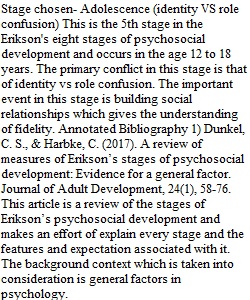


Q M5: Final Video Presentation: Annotated Outline • Points 30 • Submitting a media recording or a file upload Instructions During Module 6, you will be required to record yourself delivering a video presentation on one of Erikson's eight stages of psychosocial development. In preparation for this presentation assignment, you are asked to select one of the eight stages of psychosocial development and submit an annotated outline of your presentation to your instructor for approval. You will be expected to utilize articles from assigned readings, textbook readings, and an additional 4–6 scholarly articles on your topic. For example, if you choose Infancy, you must provide an overview of that stage of development and focus on an aspect of that stage that particularly interests you, such as attachment. Attachment will be your topic within the developmental stage. Requirements In order to successfully accomplish this assignment, please adhere to the following guidelines: • Submit your annotated outline as a Word document by the posted due date. • You will be required to include 4–6 scholarly sources that you intend to use in your presentation. • Your instructor must approve your annotated outline before you can begin working on your presentation. • Your assignment will be graded based on the assignment requirements.
View Related Questions